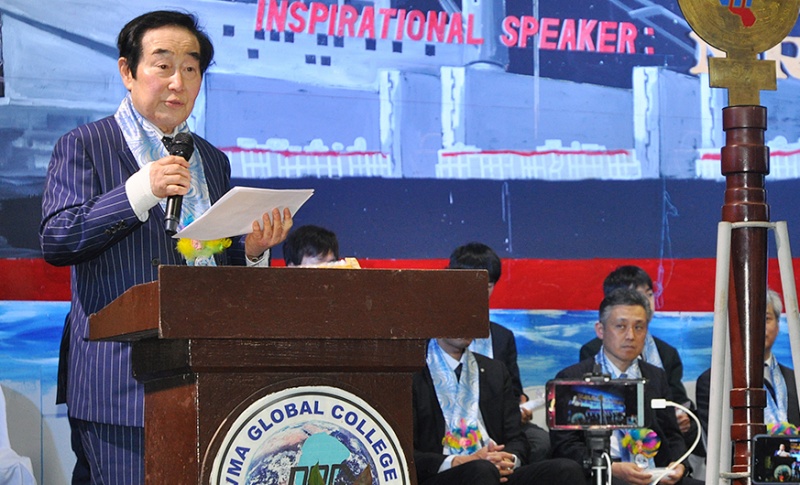Mr. Seiji Taga, President of Santoku Senpaku: A Unique Shipowner, Entertainer

At the age of 30, he resigned from the shipping company where he worked. “I had no choice but to go independent because I was constantly clashing with my superiors,” he reflected during an interview.
With just a desk and a telephone in a mixed-use building, he opened the shutters at 5 am and did whatever work he could find.
The first business Taga focused on was the seafarer supply business.
He visited maritime bureaus and seafarer employment offices in various regions such as Tohoku, China, and Shikoku. “For some reason, I had a connection with people from Tohoku, which greatly helped my manning business later on.”
Indeed, the ship management business became the backbone of Santoku Senpaku, even after it expanded into operating ocean-going vessels. The company invested in the Philippine Merchant Marine Academy and actively welcomed its graduates to join their own and managed vessels every year.
The 1970s brought a turning point.
During the ship management business dealings, Mazda, a major automobile manufacturer, approached him with an offer to buy a domestic car carrier.
He felt indebted to the offer that allowed a mere ship management operator to own a vessel.
“Without capital or credit, banks wouldn’t lend us money. Additionally, at that time, the seafarer’s union (All Japan Seamen’s Union) was very powerful, and this issue also needed to be resolved. However, thanks to the support of Mazda and Mazda Logistics, and after desperately pleading, we managed to secure support from the Small and Medium Enterprise Finance Corporation (at that time) and realized the purchase of two domestic car carriers.”
Finally, in 1981, he achieved his long-held dream of expanding into international shipping.
“The first was a coastal vessel. Soon after, through a trading company’s intermediation, we started building a 28,000 DWT vessel, based on a charter contract with Island View Shipping of South Africa. Later, I visited the region with members of the ‘Cape of Good Hope Association’ in Kure and became good drinking buddies with them.”
In the early 2000s, during the dawn of the shipping boom, he also ventured into ordering Capesize newbuilds from Shanghai Waigaoqiao Shipbuilding in China.
“At that time, Chinese shipyards were not very credible. However, I adhered to my management philosophy that ‘profit lies in the original investment’ and ‘the success of a shipowner depends on how cheaply they can acquire ships,’ and decided to place the order.”
In fact, the Capesize vessel ordered for 4 billion yen later rose in value to 10 billion yen. At the same time, he was the first Japanese shipowner to directly sign a charter contract with a major Australian resource company.
“I was criticized by major shipping companies for going against business manners. However, the executives of the resource major came directly to my office wanting to sign a contract. There was no reason to refuse.”
With a total of 110 ships, both owned and managed, Mr. Taga became one of Japan’s leading shipowners in his lifetime. He was a person who greatly valued human connections.
In August 2010, I visited the company for the first time. After an interview from noon to 1 pm while heading from Bentencho Station on the Osaka Metro Chuo Line to the Santoku Senpaku headquarters building, we had a “meal” at the Bay Hotel from just after 1 pm, but I have almost no memory until being handed an empty bottle of Hennessy at a club in Osaka’s bustling “Kita” district at 1 am the next day.
“Entertaining guests to the fullest” was his motto. In the three subsequent interviews, each time was followed by a drinking session lasting more than 10 hours. Therefore, he decided to “never drink unless expecting guests,” and he was diligent in managing his health.
Mr. Seiji Taga was a unique shipowner, an entertainer, and a hard worker. Not only journalists but also many in the shipping industry who had the chance to experience his work ethic during his lifetime are likely to feel fortunate.
(Hirofumi Yamamoto)